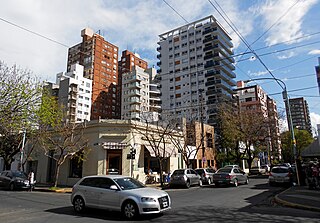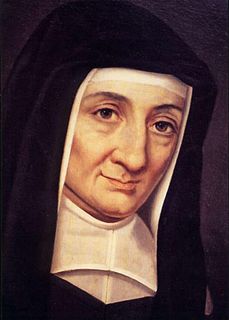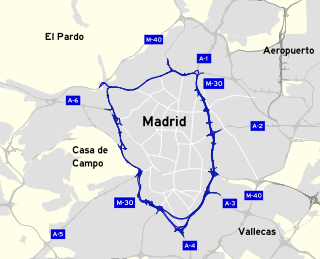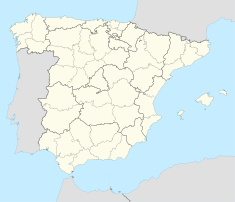
Lima is the capital and the largest city of Peru. It is located in the valleys of the Chillón, Rímac and Lurín Rivers, in the desert zone of the central coastal part of the country, overlooking the Pacific Ocean. Together with the seaport of Callao, it forms a contiguous urban area known as the Lima Metropolitan Area. With a population of more than 9.7 million and more than 10.7 million in its metropolitan area, Lima is one of the largest cities in the Americas.

Manila, officially the City of Manila, is capital of the Philippines, and its second-most populous city. It is highly urbanized and as of 2019 was the world's most densely populated city proper. It was the first chartered city in the country, designated as such by the Philippine Commission Act 183 of July 31, 1901. It became autonomous with the passage of Republic Act No. 409, "The Revised Charter of the City of Manila," on June 18, 1949. Manila, Mexico City, and Madrid are considered the world's original set of global cities because Manila's commercial networks were the first to extend across the Pacific Ocean and connect Asia with the Spanish Americas. When this was accomplished, it marked the first time in world history that an uninterrupted chain of trade routes circling the planet had been established. Manila is the second most natural-disaster-afflicted capital city in the world after Tokyo. It is among the most populous and fastest growing cities in Southeast Asia.

Possible Peru was a Peruvian political party. It was founded in 1994 by Alejandro Toledo with the original name of Possible Country.

Quilmes is a city in the province of Buenos Aires, Argentina, on the coast of the Rio de la Plata on the south east of the Greater Buenos Aires. It is the seat of the eponymous county, and has a population of 230,810. It is located 17 km (11 mi) south of the capital of Argentina, the Autonomous City of Buenos Aires.

Aunt Julia and the Scriptwriter is the seventh novel by Nobel Prize-winning author Mario Vargas Llosa. It was published by Editorial Seix Barral, S.A., Spain, in 1977.

The Company of the Daughters of Charity of Saint Vincent de Paul, commonly called the Daughters of Charity or Sisters of Charity of Saint Vincent De Paul, is a Society of Apostolic Life for women within the Catholic Church. Its members make annual vows throughout their life, which leaves them always free to leave, without need of ecclesiastical permission. They were founded in 1633 and state that they are devoted to serving the poor through the corporal and spiritual works of mercy.

The Little Sisters of the Poor is a Catholic religious institute for women. It was founded by Jeanne Jugan. Having felt the need to care for the many impoverished elderly who lined the streets of French towns and cities, Jugan established the congregation to care for the elderly in 1839.

The Assumptionists, formally known as the Congregation of the Augustinians of the Assumption, is a worldwide congregation of Catholic priests and brothers. It is active in many countries. The French branch played a major role in French political and social history in the 19th century.

Arenys de Mar is one of the main municipalities of the comarca of Maresme, Barcelona Province, Catalonia, Spain. It is situated on the coast between Caldes d'Estrac and Canet de Mar, about 40 kilometres northeast of Barcelona. As of 2010, it had a population of 14,688.

The Santa Isabel College, also referred to by its acronym SIC, is a private, Roman Catholic college owned and operated by the nuns of the Daughters of Charity in Ermita, Manila, in the Philippines. It was founded on 24 October 1632. Santa Isabel College is one of the oldest colleges in the Philippines and in Asia.
The Society of Saint Pius X has close links with several religious institutes, chiefly in France.

The M-30 orbital motorway circles the central districts of Madrid, the capital city of Spain. It is the innermost ring road of the Spanish city, with a length of 32.5 km. Outer rings are named M-40, M-45 and M-50. Its length and the surface surrounded by the M-30 is comparable to the Boulevard Périphérique of Paris or the London Inner Ring Road.

The Sisters of the Infant Jesus, also known as the Congregation of the Holy Infant Jesus or the Dames of Saint-Maur, is a Roman Catholic religious institute, dedicated to education and the training of underprivileged schoolchildren. They were founded in Rouen, France, in 1666, as part of the work of Nicolas Barré, a Minim friar and Catholic priest (1621-1686), who had gathered some young women for the free instruction of the poor in 1662.

Jeanne Jugan, also known as Sister Mary of the Cross, L.S.P., was a French woman who became known for the dedication of her life to the neediest of the elderly poor. Her service resulted in the establishment of the Little Sisters of the Poor, who care for the elderly who have no other resources throughout the world. She has been declared a saint by the Catholic Church.
A religious brother is a member of a Christian religious institute or religious order who commits himself to following Christ in consecrated life of the Church, usually by the vows of poverty, chastity and obedience. He is a layman, in the sense of not being ordained as a deacon or priest, and usually lives in a religious community and works in a ministry appropriate to his capabilities. A brother might practice any secular occupation. The term "brother" is used as he is expected to be as a brother to others. Brothers are members of a variety of religious communities, which may be contemplative, monastic, or apostolic in character. Some religious institutes are composed only of brothers; others are so-called "mixed" communities that are made up of brothers and clerics.

Tegucigalpa, formally Tegucigalpa, Municipality of the Central District, and colloquially referred to as Tegus or Teguz, is the capital and largest city of Honduras along with its twin sister, Comayagüela.
Little Sisters of the Poor Home for the Aged may refer to:
The Sisters of the Christian Doctrine of Nancy (D.C.) is a religious order of the Roman Catholic Church for women, whose primary mission is the teaching and nursing of the poor. Its members place after their names the order's initials, D.C. They are known as the "Vatelottines" in honor of their founder, and also "School Sisters", especially in Germany and Luxembourg, because of their primary mission. They should not be confused with the Spanish order of the Sisters of the Christian Doctrine (Mislata), which was founded in 1880.

The Mayor of Zalamea is a play written by Pedro Calderón de la Barca (1600–1681) during the Golden Age of Spanish drama. It was probably written in 1636. It pays homage to a play by the same name by Lope de Vega, which it surpassed in fame through its superior character development, becoming one of the most well-known plays of its time. This play has three acts that explore the power of the self-made man against the political authorities of 17th century Spanish society, and the continuous struggle between corporate and individual honor.















